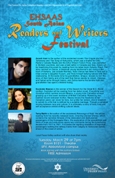By Ali Siemens (Staff Writer) – Email
When and where will this event take place?
Tuesday, March 29th at 7 pm, B101 Theatre Room, UFV
Where can interested readers get a copy of the novels that the authors will be readings?
UFV bookstore … the library may also have some copies.
Why is this event taking place?
The Ehsaas South Asian Readers and Writers Festival is part of a yearlong celebration of the Centennial of the Gur Sikh Temple; 2011 marks the hundred year anniversary of the development of the first Sikh temple in Canada. This event is particularly important to the Sikh community, as this was one of the first foundations of our presence. This particular event will allow for community dialogue to occur about the challenges that diaspora groups face when immigrating to new places; in particular this event will engage reflection on the establishment of the South Asian community here in the Fraser Valley and our experiences.
Who should come & What if I haven’t read any of the novels?
This an open event and everybody is welcomed to come. Even if you haven’t read the novels, (although I highly suggest it!) this event will present useful questions and answers about varying Diasporas, South Asian history, and cultures in the Fraser Valley.
Who is reading and what are they reading about?
The framework that this event is set up around is particularly interesting because it will walk readers through the passage of the South Asian diaspora in Canada and specific to the Vancouver region from past, present, and future perspective. Tariq Malik, who will be reading from his latest publication, Chanting Denied Shores, and will focus the North American west coast during the pre-war period of 1907–1914, specifically the Komagataru incident. Gurjinder Basran will be reading from her novel Everything was Goodbye, which centers around Meena, a young Canadian woman growing up in the lower mainland of British Columbia and traces her life as she struggles to assert her independence in a Punjabi community.
My own work “Family Honor: A Review of Everything is Goodbye” is a review of Basran’s work; I consider why honour is such a significant factor of the South Asian community and how this influences youth in their construction of identities. I hope to challenge community members, to ask questions about the way we construct our identities, rather than accepting certain expectations in a passive manner.
Anosh Irani continues the theme of considering identities and how extreme cultural pressure affects the choices that individuals make. Irani’s novel Dhanu Road is at the center of this event and discusses the Zoroastrian diaspora in India. His work is centered around the story of Zairos, a dissolute young landowner’s son living in the town of Dahanu, just outside Bombay, when his life of careless luxury is brought up short by a mysterious death: the sudden suicide of Ganpat, a tribal worker on his family’s estate.
Can you share something new that you learned through your participation in this upcoming event?
Well something simple is that I noticed that the word Ehsaas has been commonly used when describing the events that are linked to the commemoration of Centennial of the Sikh. To be honest, I didn’t actually know the meaning of this term until recently (quite embarrassing); I had to ask a friend. She reported Ehsaas that is a Punjabi/ Hindi words that means “reflection”. This is a perfectly fitting word as this is an opportunity for readers to reflect on the South Asian diaspora and what has shaped our experiences here in Canada.


